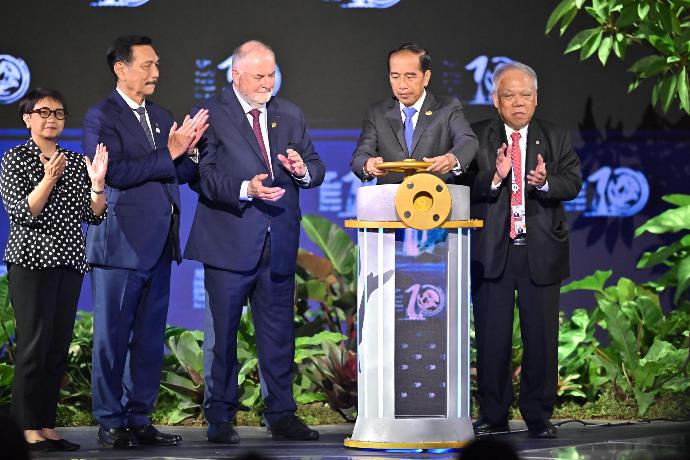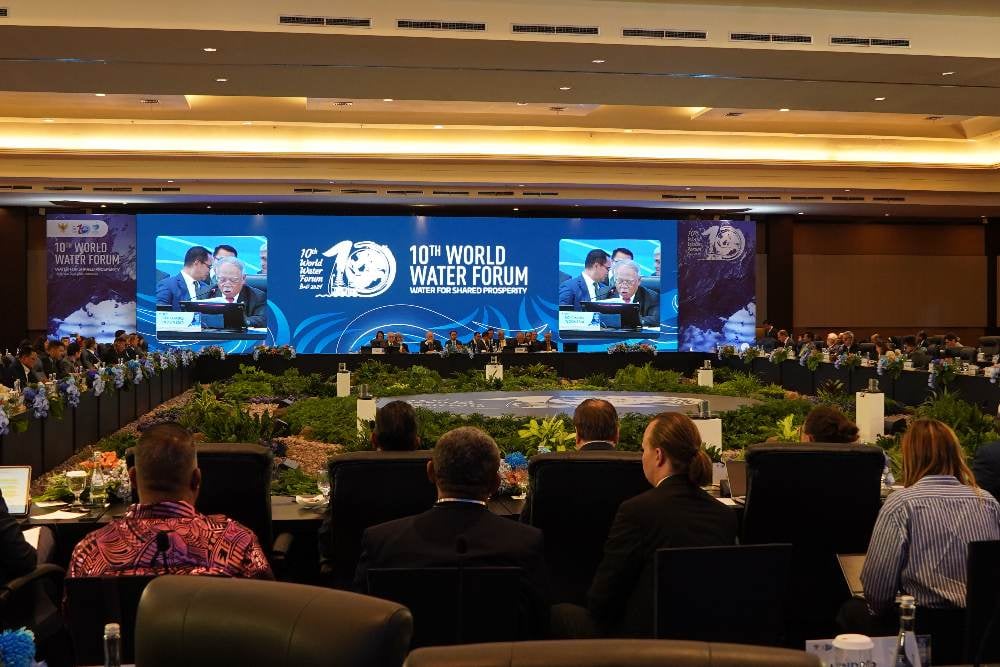Bisnis, BADUNG — Funding for water infrastructure projects is one of the key topics discussed at the 10th World Water Forum in Bali. While this crucial sector requires substantial amount of financing, investments in water infrastructure is still deemed to be risky.
Neeta Pokhrel, director of Southeast Asia and the Pacific at the Asian Development Bank (ADB), emphasized the importance of collective action from governments, communities, and investors to boost funding in the water sector. According to Neeta, project certainty, innovation, and accurate data are crucial for banks to fund investments.
In 2023, ADB provided loans for water projects amounting to $2.830 billion, up from $1.591 billion the previous year. This includes projects for clean water supply, sanitation, waste management, agricultural irrigation, flood management infrastructure, hydroelectric power plants, and water resource management. The highest water project financing by ADB in the last decade was in 2018, reaching $3.205 billion.
"We have several investable credit projects, but we must work collectively to ensure that the conditions I set align with your projects," Pokhrel remarked during a high-level panel at the World Water Forum on Wednesday (22/5/2024).
Neeta outlined several strategies to increase funding in the water sector, the first being accommodating government policies. However, Pokhrel reiterated that governments need to understand data from a water project investment and prioritize water and the environment.
Second, investors need to understand the management of the water projects they will fund, including data, readiness, and investment plans. Third, there needs to be an understanding of the project’s climate vulnerability and absorption capacity.
"How committed are you to investing in the water and sanitation sector? However, to do this, we must provide data showing that non-investment will harm us," Pokhrel said.
Franz Rojas-Ortuste, division head of water and sanitation analysis at the Development Bank of Latin America and the Caribbean (CAF), argued that policy reforms are needed to attract bank financing for water investments. Governments should provide incentives for environmentally friendly water investments and ensure that water projects are well-planned.
"This is not about better government, but we need to develop a private sector recognized by society and academia," said Rojas.
Water Endowment Fund
Indonesia called for the establishment of a global water fund and a water endowment fund at the 10th World Water Forum to support sustainable water resilience. The Public Works and Ministry’s Infrastructure Financing Director General Herry Trisaputra Zuna admitted that water and sanitation projects have so far relied on public funds from the state budget, which thus far have been insufficient.
Meanwhile, 2030 Sustainable Development Goals (SDGs) point six estimates the global water sector budget needs at $6.7 trillion, while available public funds are less than 2 percent per year from the state budget. President Joko Widodo officially opened the 10th World Water Forum at the Bali International Convention Center (BICC) Nusa Dua Bali, Monday (20/05/2024). (Photo: Regency Secretariat Public Relations/Rahmat).
President Joko Widodo officially opened the 10th World Water Forum at the Bali International Convention Center (BICC) Nusa Dua Bali, Monday (20/05/2024). (Photo: Regency Secretariat Public Relations/Rahmat).
"We need to involve the private sector in water projects," said Herry.
The proposal to establish a global water fund aims to address water and sanitation issues for member countries. However, he said further talks are needed about the proposal before it can move forward.
Indonesia also proposed the establishment of a water endowment fund aimed at financing the management of existing water infrastructure. Herry claimed that the existence of the water endowment fund could support sustainability and conservation efforts of water resources.
According to the proposal, the financing of the water endowment fund will come from contributions from water resource managers. As of now, the Indonesian government imposes water resource management service fees (BJPSDA) on several enterprises, such as hydroelectric power plants and drinking water companies.
"As an endowment fund, the funds obtained must first be invested, and the investment returns will then be used to maintain water infrastructure," he explained.
Long-Term Investment
Investment in the water sector carries significant risks, particularly concerning time. Irwan Dinata, CEO of PT Moya Indonesia, said water projects require a long time of around 10-15 years to generate profits, hence requiring long-term partnerships.
"These projects cannot be run alone; partnerships are necessary because this is a long-term investment. Can investors hold their breath for 10-12 years?" said Irwan.
However, he affirmed that once projects are running from upstream to downstream, profits will start to generate.
"No need to worry; look at it holistically," Irwan said.
Tourism and Creative Economy Minister Sandiaga Uno, who has been involved in the water sector, emphasized that business in the water sector is a long-term investment. Harmonious collaboration between the government and private sector is crucial for achieving efficiency in this business.
"The business world should not only seek short-term profits but should see it as a long-term investment," said Sandiaga.
